'Down's syndrome is an ability, not a disability'
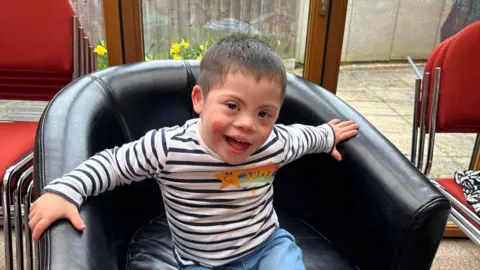 Rebecca Millard
Rebecca MillardWhen Rebecca Millard was told her baby had Down's Syndrome she simply said: "So what?"
The 41-year-old was previously told she would never have children.
So when son Henry came along four years ago, she felt "blessed".
On World Down's Syndrome Awareness Day, she, along with two other mothers, say Down's syndrome is "an ability, not a disability".
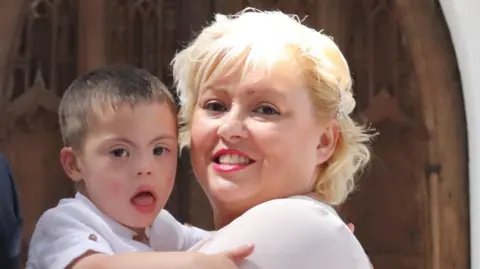 Rebecca Millard
Rebecca Millard"He's a little firecracker - I call him my Tasmanian Devil," Ms Millard says.
Ms Millard, who lives in Diss, Norfolk, learned about Henry's condition when he was born.
"It didn't matter to me because in my 20s I was told I couldn't have children," she explained.
"When [the doctors] told me, they were expecting a completely different reaction.
"I said, 'so what, he's my son, I love him no matter what'."
Henry is non-verbal but has just started to learn Makaton - a form of sign language that can also use symbols and speech.
He has picked up five signs and is now able to communicate his needs.
"I never thought he would sign," Ms Millard continued. "He still tries to talk - he's a little chatterbox."
'Common misconceptions'
Support is crucial for both Henry and his mother and every six weeks they attend the Down's Syndrome Suffolk support group.
"Your child can run around and you feel safe that they can't do anything other than play with each other," she said.
"It's so lovely to be able to speak with other parents - if you've got any queries you can ask someone who has an older child and has been through it already.
"It means a lot to have the group."
She said she felt there were common misconceptions about those living with Down's syndrome.
"They call them Down's syndrome children - they are a child first, before they have Down's syndrome," she said.
"The things Henry has done where I've thought he's never going to be able to do this, he can.
"He's proven me wrong and he's so independent.
"Having Down's syndrome is not a disability, it's an ability."
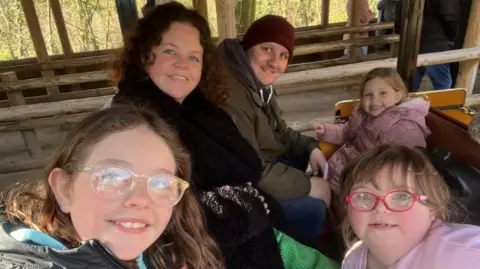 Hannah Palmer
Hannah PalmerHannah Palmer, 31, from Leiston, Suffolk, also attends the support group with her nine-year-old daughter, Maisie.
When she was born, Maisie was "whisked away" from Mrs Palmer and her husband Gary to a neonatal intensive care unit.
"I had a feeling something wasn’t quite as expected with Maisie [based on] the visits from doctors and all the questions," Mrs Palmer said.
The couple, who have two other daughters, say they were asked by doctors if Maisie "looked different" to their older daughter.
"Something inside of me realised she was suggesting Maisie has some of the characteristics of a child with Down's syndrome," Mrs Palmer added.
While usual tests during the pregnancy did not show any chance that Maisie would be born with Down's syndrome, five days after her birth doctors confirmed the diagnosis.
'So rewarding'
"We felt numb for a while," Mrs Palmer continued.
"It was hard at first not to compare her to our first daughter, especially around milestone ages, but we soon realised she’ll do everything in her own time.
"When she did reach a milestone it made it all the more special."
Speaking about the Down's Syndrome Suffolk support group, Mrs Palmer said she had "never felt so welcome" and she "could breathe" there.
Mrs Palmer urged other parents of children with Down's syndrome never to be "afraid to talk and ask questions".
"Cherish your little one - it’s one crazy, emotional, incredible journey that is so rewarding.
"You’ll look at life in a completely different, more positive way."
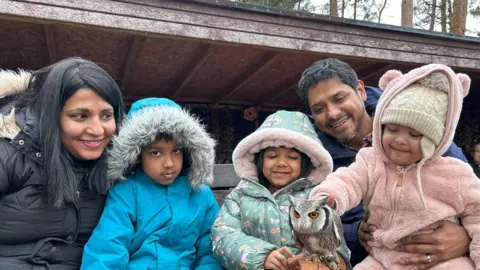 Fahmida Islam
Fahmida IslamFahmida Islam, 44, from Kesgrave, near Ipswich, said she had a "perfectly normal" pregnancy with her daughter, Sumayyah.
Mrs Islam and her husband, Moni, found out Sumayyah had Down's syndrome two days after she was born.
She said the initial diagnosis left them shocked - which was worsened by negativity about the condition online.
However, Mrs Islam said Sumayyah's extra chromosome "makes her who she is".
"I wouldn't change Sumayyah for the world, but I would change the world for Sumayyah," she said. "She's such a joy.
"Whoever Sumayyah meets they don't leave without a smile on their face.
"When I first found out the diagnosis if only I had known this at the time, otherwise I wouldn't have spent so much time being upset.
"I try to tell as many people as possible don't be upset or scared, you'll be overwhelmed by the joy your child brings.
"If someone invented a medicine or a drug that could take away the extra chromosome and make her like everyone else, I would decline it."
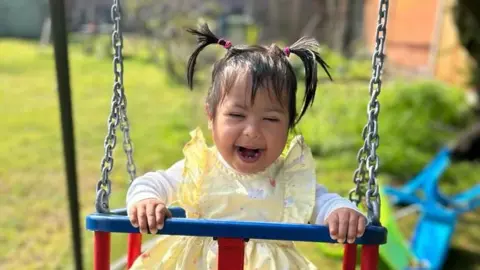 Fahmida Islam
Fahmida Islam The Islams say the Down's Syndrome Suffolk support group is key for the family, as it allows them to bring along their other children Habeeb, eight, and Amelia, five.
"The group gives them something to do and they love going as much as Sumayyah," Mrs Islam said.
"It's nice to see them have a bit of down time to play with the siblings of other children with Down's syndrome.
"They can see they're not the only siblings with a brother or sister with Down's syndrome and that it's normal.
"They can see there are other children there just like them."
Mrs Islam praised the way Habeeb and Amelia treated their sister and how much support they offered Sumayyah.
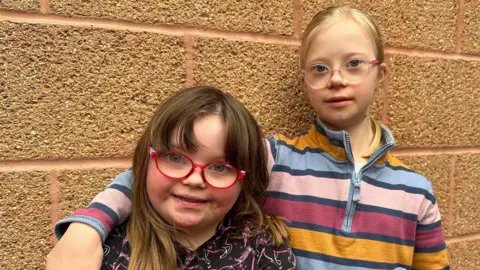 Julie Nightingale
Julie NightingaleJulie Nightingale set up the Suffolk Down's Syndrome Support Group 10 years ago when her daughter, Jasmine, was two.
She said that there were no other groups like it available.
"It felt very isolating at the time," she said.
"But through the group we have had the privilege of meeting lots of other lovely children and their families."
The group meets every six weeks at Colchester Road Baptist Church in Ipswich and includes games for the children along with food and drink.
Mrs Nightingale said all families were welcome to join.
Follow East of England news on Facebook, Instagram and X. Got a story? Email [email protected] or WhatsApp us on 0800 169 1830
